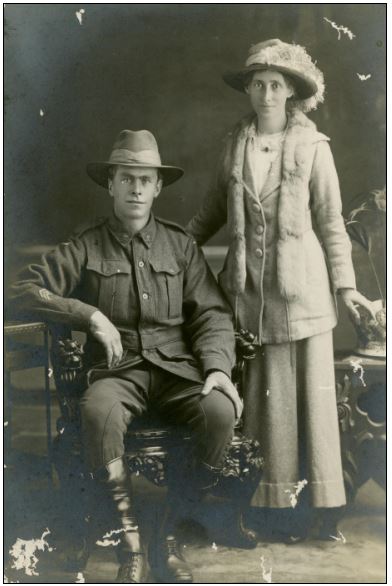Difference between revisions of "William Thomas Saw"
From Our Contribution
| Line 8: | Line 8: | ||
| image = [[File:Saw_William_Thomas_WW1.jpg|border|]] | | image = [[File:Saw_William_Thomas_WW1.jpg|border|]] | ||
| − | | caption = Courtesy Saw Family | + | | caption = William and Lillian Courtesy Saw Family |
| image2 = | | image2 = | ||
| caption2 = | | caption2 = | ||
Revision as of 20:07, 11 May 2018
 William and Lillian Courtesy Saw Family | |
| Personal Information | |
|---|---|
| Date of Birth | 15 Apr 1883 |
| Place of Birth | Armadale, Western Australia |
| Death | 14 Oct 1958, aged 76 |
| Place of Death | Swanbourne, Western Australia |
| Age at Enlistment | 32 years, 9 months |
| Description | 5'10½" (1.79m) tall; weight 153 lbs (69.4 kg); fair complexion, blue eyes, light brown hair. |
| Occupation | farmer |
| Religion | Church of England |
| Address | NOK 'Dudley' Shenton road, Claremont, Western Australia |
| Next of Kin | Wife Mrs Lillian Susanah Saw |
| Military Information | |
| Reg Number | 5785 |
| Date of Enlistment | 1 Mar 1916 |
| Rank | Private |
| Unit/Formation | 16th Battalion, 18th Reinforcement / 4th Brigade, 4th Division |
| Date of Embarkation | 18 Jul 1916 - 9 Sep 1916 |
| Ship Embarked On | HMAT A48 Seang Bee |
| Date of Return | 4 Jun 1919 - 18 Jul 1919 |
| Ship Returned On | SS Bremen |
| Fate |
Wounded in Action 11 Apr 1917 1st Bullecourt Wounded in Action 26 Sep 1917 Polygon Wood Returned to Australia |
| Monument |
Armadale War Memorial (Armadale panel) Armadale Congregational Church Honour Board Armadale and Districts Roll of Honour |
| Medals |
British War Medal Victory Medal |
Pre War
1915 William married Lillian Susanah Boatwright in Claremont. Lillian died 24 Jan 1955, aged 76. Electoral Roll entries - 1906 farmer in Armadale; 1909-1912 Teamster, Armadale.
War Service
On arriving at Blackboy Hill camp, William was initially allocated to Pioneers until on 4 Apr 1916 when he transferred to the 18th reinforcement draft for the 16th Battalion.
On arrival in England he joined the 4th Training Battalion at Rollestone before proceeding overseas to France on 14 Oct 1916.
On 30 Oct 1916 he was taken on the strength of the 16th Battalion at Pont Remy on the Somme River, south of Abbeville. He spent from 25 Feb to 17 Mar 1917 ll with scabies. (note: one other entry mentions VD with 44 days ineffective service).
On 11 Apr 1917 he participated in the Australian attack on the German defensive line (Siegfried or Hindenberg Line) near Reincourt (1st Battle of Bullecourt). The wounds he received were caused by either a shell of a grenade, resulting in severe wounds to the abdominal wall. Initially his wounds were treated by the 13th Australian Field Ambulance, before being passed back to the 49th Casualty Clearing Station and then on 16 Apr 1917 he was admitted to the 1st Australian General Hospital at Rouen.
On 27 Apr 1917 he was evacuated to England aboard the HMHS Grantully Castle from Le Havre and admitted to the 1st Southern General Hospital in Birmingham. On 21 May 1917 he was granted leave, and he reported a fortnight later to the Training Depot at Wareham to begin the journey back to his unit, which he achieved on 12 Aug 1917.
Soon after his return, on 26 Sep 1917 he participated in the Australian advance on Polygon Wood and was again severely wounded, this time in the arms. Admitted to the 10th General Hospital in Rouen the following day, he was on 8 Oct 1917 for a second time evacuated to England. Entering the University War Hospital in Southampton on 9 Oct 1917, he was transferred to the 3rd Australian Auxiliary Hospital in Dartford on the 19th before being released to furlough on 22 Oct 1917.
On 6 Nov 1917 he reported to the No 1 Command Depot at Sutton Veny to again begin the journey back to his unit and the battlefields. He rejoined the 16th Battalion on 3 Dec 1917 at Friville-Escarbotin, near the French coast, just as it received orders to prepare for an early return to the forward areas near Péronne.
William was admitted to hospital in Le Tréport with VD on 29 Dec 1917, before returning to his unit on 18 Feb 1918. William was appointed Driver on 12 Oct 1918, and spends most of Nov 1918 on leave.
On 22 Mar 1919 he began the journey back to Australia via England.
Discharged 5th Military District 30 Aug 1919.
"Enlisted 4th February, 1916, and sailed in July with the 18th Reinforcements of the 16th Battalion. Went to the front in October, 1916."[1]
Post War
Electoral Roll entries - 1919 -1943 both at Albany road, Armadale (dairy farmer); 1949- 1958 at 18 Brassey street, Claremont retired. [No descendants]
References
- ↑ "The Drill of the Foot-Hills" (PDF) (1917). Western Australia. Mar 1917. p. 7. Retrieved 16 May 2017 – via State Library of Western Australia.